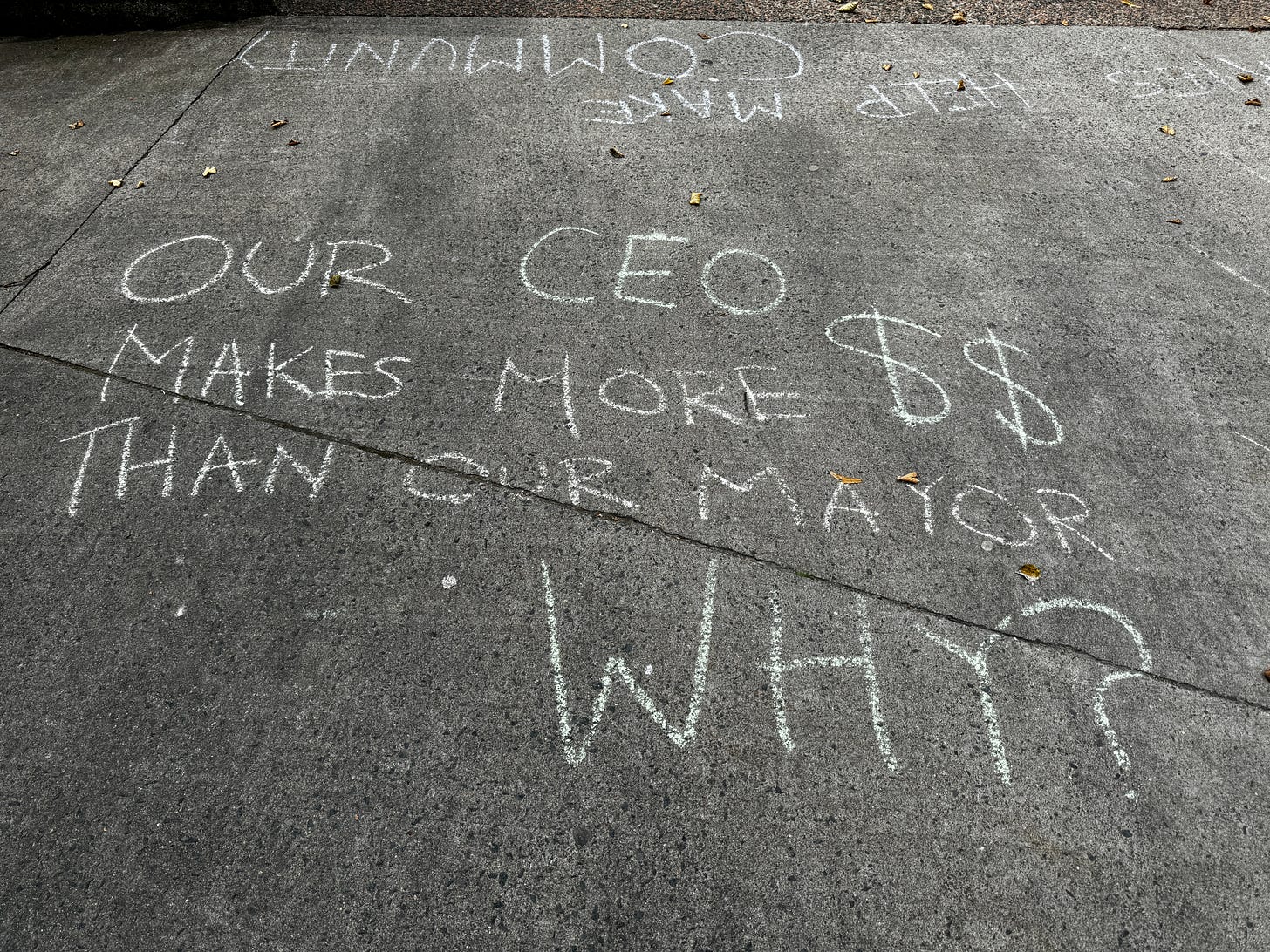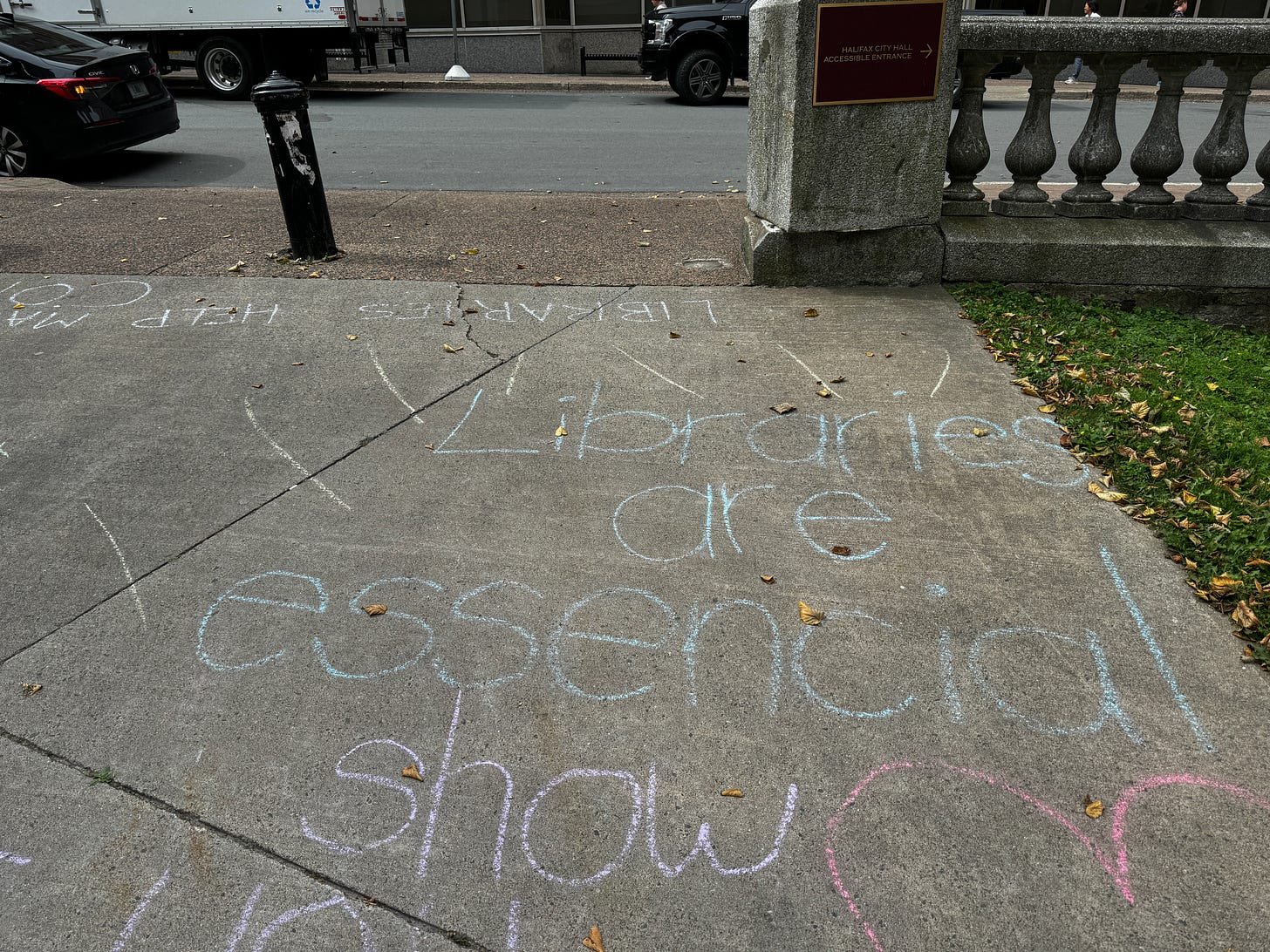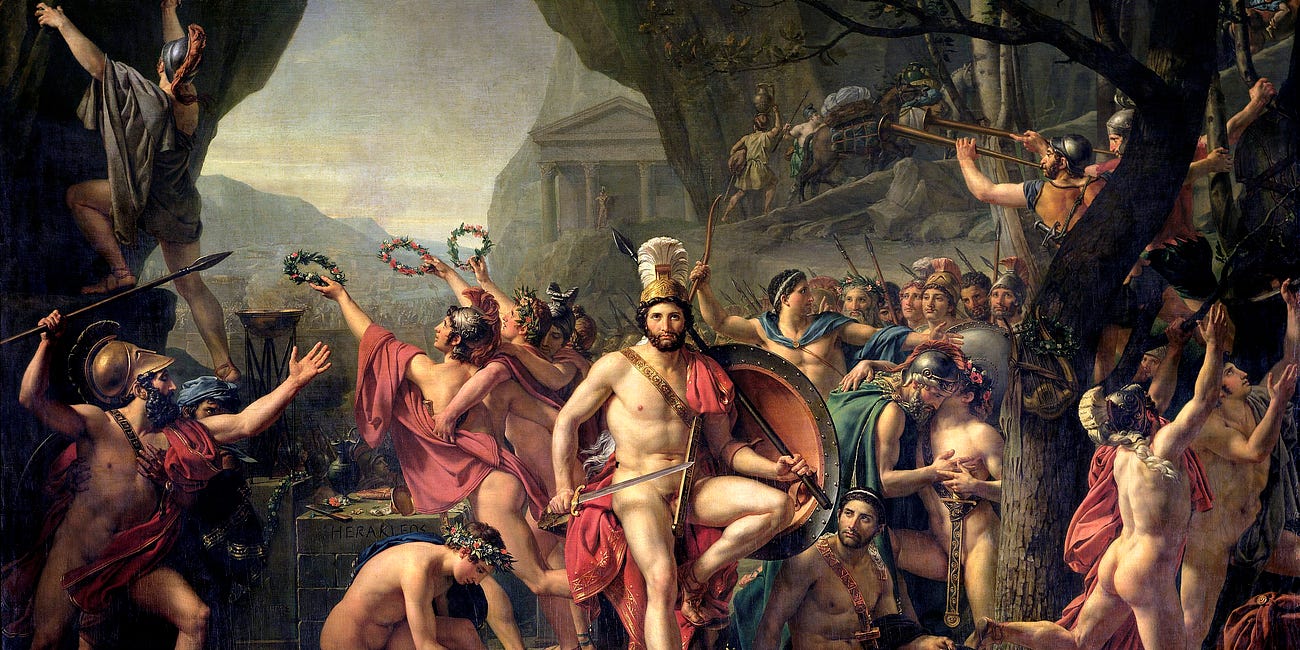On September 3, there was rally at City Hall organized by NSUPE Local 14 supporting striking Librarians.
Community members and other unions also came out to support library workers.
While Halifax Public Libraries is technically a separate entity from Halifax Regional Municipality, libraries are funded by the city budget. The budget is about $30m a year and you can find the details here. Spoiler alert: though labour is the biggest expense the new building (a new type of architecture that I despise) costs A LOT.
We have to be clear that when that public employee union is rallying against “The Man”, that man is me and you, and the increased wages they want will come from property tax dollars. So it’s not quite good enough to just say ya we support the library workers, everyone deserves more money, and all the rest - because we’re also saying we want lower taxes and smaller government. They are two sides of the same coin. There is no titan of industry monopoly man keeping the money, and there is no profit to share. This isn’t your grandma’s trade union. When it comes to money it is a true zero-sum game, more like x&O’s than chess, with only a few tricks.
I won’t press that any more. The biggest mistake in Economics was outlined in 1946 in a little book by Harry Hazzlit called ECONOMICS IN ONE LESSON. Concise and instructive, it is also deceptively prescient and far-reaching in its efforts to dissemble economic fallacies.
The "One Lesson" is stated in Part One of the book: "The art of economics consists in looking not merely at the immediate but at the longer effects of any act or policy; it consists in tracing the consequences of that policy not merely for one group but for all groups."
When this is done with the library strike it becomes clear we are both the bad guy and the good guy, wanting to pay less taxes but also wanting to give struggling workers more. Unfortunately, the only way to untangle that Gordian knot is to learn more about how government, our government business, works and get more involved.
Which leads me to this.
After the protest, I got to take some time looking at all the drawings, hopes, and slogans the strike supporters chalked around City Hall. I was particularly struck by this… I don’t know who posed this question, but it’s an interesting one.
We know the Library folks have their minds on their money and their money on their minds like The Gourds sipping in gin and juice and channeling Snoop Dog. Wages are a key piece of the bargaining puzzle that led to the strike.
But increasingly the very meaning and nature of Library has changed - more in the last 10 years than in the last 2,000.
Libraries, once quiet temples of learning, are now battlegrounds for social services. On the plus side, they’ve evolved into community lifelines, offering warmth, resources, and a safe space for society's most marginalized. But is it noble or just a smoke screen? On the flip side, they've become de facto homeless shelters and triage stations, with librarians doing the jobs of social workers, all while City Hall shrugs and moves on. It’s a cunning way for governments to co-opt goodwill and pass the buck, leaving libraries as the last line of defense in a crumbling social safety net. For the striking librarians, it’s reasonable to ask for Social Worker wages to do social work.
I can’t solve this here. But the answer is clear in two steps.
1/ Many more citizens need to become WAY more involved in government and frontline issues, not just when they are angry and self-interested like the striking librarians and their supporters, but every day. If there’s one thing the writers at the Spring should know it is that Socialism takes up a lot of evenings and weekends.
2/ If we are counting what counts we notice over and over again the things that matter most to us happen at the frontline, at the places where government and the public meet. But over and over the government's bureaucratic solution is to add more systems, more studies, more middle management, or more top end. Libraries, social work, healthcare, just about any department or function you can name. Just like in WWI trench warfare, no one wants to be at the frontline. We need to incentivize and support government workers at the frontline, not add more middle and top. As Dr. John Savage put it in the 1990’s (and lost his job for it..)
…uncovering a maze of inefficiency, needless red tape, isolated bureaucratic empires, high stress, low morale, dismal productivity--in short, broken government, and an inefficient, rule-driven bureaucracy that is completely ill-adapted to respond to the demands of a world in transition.
The solutions include cutting out layers of bureaucracy; wholesale elimination of departments, agencies, and divisions; decentralized decision-making; new management ideas, and radically altered attitudes. It won't be easy.
The one thing I can do is answer the librarian’s question above.
“Our CEO makes more $$ than our mayor. Why?”
UPDATE: I got a note from a great friend and learned there’s another way - which I’m sure is correct - to read this note. The CEO in the Graffiti is the Chief Librarian… also known as a CEO, not the City CAO. There’s very little breakdown on the Library’s financials but here’s the big picture from the City Budget and the public disclosure statements: About a $30m a year budget. $21m in Salaries and benefits.
According to public disclosure, the Chief Librarian doesn’t, in fact, make more than the mayor. But it is close.
The rationale for this is the same as my early rationale as to why the CAO, and others, make more than the mayor.
It seems like a big number to regular people but there are lots of police constables and other jobs of all sort at City Hall that make as much or more. You be the judge.
SIDEBAR: If you are interested and want to be disheartened, here’s the latest listing of all the top salaries at City Hall.
https://cdn.halifax.ca/sites/default/files/documents/city-hall/accountability-transparency/2023-24-statement-of-compensation.pdf
Halifax City Hall doesn’t have a CEO, we have a CAO.
The key difference between a CEO (Chief Executive Officer) and a CAO (Chief Administrative Officer) lies in their scope of responsibility and focus within an organization.
- CEO (Chief Executive Officer): The CEO is the highest-ranking executive in a company, responsible for the overall vision, strategy, and direction. They make the big-picture decisions, set long-term goals, and are the public face of the organization. CEOs often work closely with the board of directors to ensure the company’s growth and success.
- CAO (Chief Administrative Officer): The CAO focuses more on the internal operations and administrative functions of the organization. They ensure that day-to-day operations run smoothly and are responsible for overseeing departments like HR, finance, legal, and general administration. While they may report to the CEO, their focus is more on execution than strategy.
In essence, the CEO sets the vision, while the CAO ensures the engine runs efficiently to bring that vision to life.
It’s confusing for two reasons:
1 - GOVERNMENT IS NOT A BUSINESS
2 - NO ONE IS RESPONSIBLE OVERALL
A generation of top government officials coming at it with MBA’s trying to apply business school ideas to government is a rain that falls equally on us all and the citizen’s constant search to speak to the Boss of government causes even more agonizing Wizard Of Oz adventures that end in tears… or a disappointing talk with Justin Trudeau.
Weak Mayor Government
In Halifax's Weak Mayor or (CAO-Council) system, the mayor's role is largely symbolic, acting as a figurehead and spokesperson with no executive power. The real administrative authority rests with the CAO (Chief Administrative Officer), who is appointed by the council and oversees daily operations, implementing council policies and managing the city's departments.
This form of government became popular because it separates political leadership from day-to-day administration, ensuring a professional, non-partisan expert (the CAO) runs city operations efficiently. The mayor, while important in expressing the citizen’s vision and acting as a public advocate, doesn't manage city functions directly.
The CAO often makes more than the mayor because they handle the heavy lifting—managing large budgets, overseeing services, and ensuring operational efficiency. Their role requires a high level of expertise in administration, whereas the mayor's role, while still crucial, is more politically focused.
Halifax’s current CAO is Cathie O'Toole (at a little over $300k), who took on the role in January 2023. She brings over 30 years of public sector experience, previously serving as the General Manager of Halifax Water, where she managed major financial and operational aspects of the city's water utility. Before that, she held various positions within the Halifax Regional Municipality, including Director of Finance and Director of Infrastructure and Asset Management.
O'Toole holds a Master of Business Administration and is a Chartered Professional Accountant, recognized as a Fellow in Nova Scotia. Her leadership style is described as collaborative and results-oriented, and she oversees a budget exceeding $1 billion and a workforce of around 5,000 employees. Her appointment reflects Halifax's need for an experienced administrator as the city navigates rapid growth and increasing service demands.
If you want someone like that to be responsible for all this you gotta pay.
Related:
Hey, Who's Running This Town Anyway?
With only a few months to go until the municipal election, most people are going to the polls with the impression the Mayor runs the city. Nothing could be further from the truth in Halifax.
The Bureaucratic Party of Canada
The Bureaucratic Party of Canada is now by far the largest, best organized, most well-financed, and most influential political party in the country. It has by far the most active members and best media connections.













Fascinating.
One thing which has caused a problem in the library wage structure is the constant use of a flat percentage increase in wages, which over the course of several contracts results in the higher earning personnel earning proportionately more, while those at the lower end of the scale slip lower. A further complication with the library is the people who shelve the books have a wage which is tied to the minimum wage. Some years ago this group was given aa bit of a boost and I understand they now earn minimum wage plus $1.25 an hour. These jobs are part time, and when a schedule requires them to come in from, say, 10-12 or to work a split shift, plus be expected to fill in at the drop of a hat, it becomes more difficult to find another position either in the library or another occupation also using part time workers which can mesh with the library hours. To their everlasting credit the unionised library workers who have been offered a reasonable increase (although they would prefer a dollar amount to iron out the inequities caused by the historic percentage raises) these employees are standing by those at the bottom of the pay scale, including those who, under the current system, are not going to receive an increase until the minimum wage goes up.
It's worth noting that the highest paid *unionised* workers, qualified librarians, are barely reaching the living wage for Halifax residents.